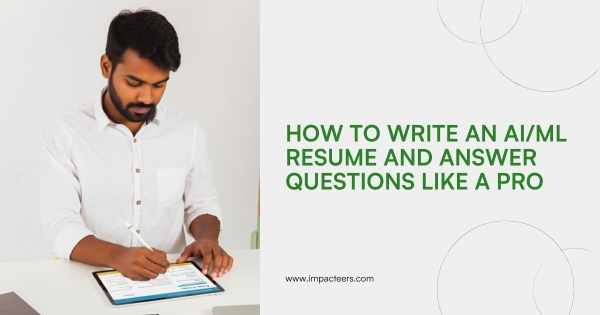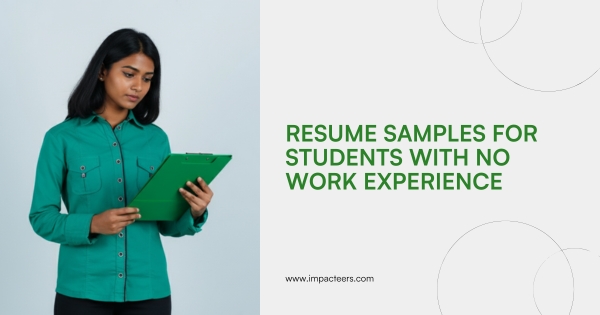AI/ML interview questions are an important part of the job preparation, and making them a strong re -introduction increases the chances of landing your top roles.
Artificial Intelligence and Machine Learning are no longer futuristic buzzwords. They run today’s products- recurrence system, chatbot, fraud detection and future analysis. With this growth, IT professional and job seekers are running towards AI/ML career.
But here is the truth: it is not easy to rent. Recruitors filter thousands of resumes, and interviews only test more than coding. Success comes from the smart mix of re -starting writing, project storytelling, and clarity with the smart mix of handling hard AI/mL interview questions.
Visit Us >>> https://www.impacteers.com/home
1) Why the Resume Matters in AI/ML Careers
For many recruiters, your resume is the first test. It’s not about fancy design; it’s about clarity and credibility. A strong AI/ML resume shows:
- Tools and frameworks you master (Python, TensorFlow, PyTorch).
- Real-world applications of those tools.
- Impact measured in results, not just responsibilities.
Think of your resume as your first answer in the hiring process.
2) The Structure of a Winning AI/ML Resume
A solid resume builder helps with layout, but content is what makes you stand out. Use this structure:
- Headline: “AI/ML Engineer | Python | Deep Learning | NLP.”
- Summary: Three lines highlighting expertise and career goals.
- Skills: Core ML techniques, libraries, tools.
- Experience: Achievements with measurable outcomes.
- Projects: GitHub links, Kaggle competitions, research papers.
- Certifications: Machine learning, data science, or cloud platforms.
3) Table: Key Resume Sections That Recruiters Scan
| Section | Content to Highlight | Why It Matters |
| Headline | Role + skills (AI, ML, NLP, Deep Learning) | Quick recruiter snapshot |
| Summary | 3 lines of strengths + career focus | Sets tone for the entire resume |
| Skills | Python, R, TensorFlow, PyTorch, SQL | Proof of technical foundation |
| Experience | Measurable outcomes (“Improved model accuracy 15%”) | Shows impact, not just tasks |
| Projects | GitHub repos, Kaggle work, case studies | Demonstrates practical application |
| Certifications | ML, AI, cloud, data analytics | Adds credibility and structure |
4) Resume Writing Hacks for AI/ML Roles
- Keep it concise—one page for freshers, two for experienced.
- Use active verbs: designed, optimized, deployed, automated.
- Quantify wherever possible: “Reduced training time by 30%.”
- Link to live projects or GitHub.
- Match keywords from job postings.
5) Common Resume Mistakes in AI/ML Jobs
- Listing every single programming language.
- Adding only academic projects without context.
- Copy-pasting responsibilities from job descriptions.
- Forgetting to update LinkedIn.
Employers want proof you can deliver value, not just that you learned from online courses.
6) Beyond the Resume: Preparing for AI/ML Interviews
Writing a developer resume gets you shortlisted. But cracking the role depends on handling ML interview questions with confidence.
Most interviews cover:
- Core ML concepts (bias-variance, regularization).
- Problem-solving through case studies.
- Application of algorithms in real-world contexts.
- Communication of results to non-technical managers.
7) Storytelling During Interviews
Instead of memorizing answers, think of interviews as conversations. Employers look for clarity, not complexity. Example: when asked about a project, explain the problem, approach, tools, and results.
This storytelling approach works better than throwing technical jargon. It also makes you look confident and job-ready.
8) Soft Skills: The Overlooked Differentiator
In technical roles, soft skills are often underestimated. But in AI/ML, they matter as much as coding. Why?
- You’ll present results to business teams.
- You’ll collaborate with developers, analysts, and managers.
- You’ll explain models in simple terms.
Strong communication and problem-solving help you stand out among job seekers with similar technical skills.
9) The Role of LinkedIn and Networking
Your LinkedIn profile often reaches recruiters before your resume does. Add:
- “AI/ML Engineer” in your headline.
- Projects and certifications in your profile.
- Regular posts about machine learning trends.
Networking is the hidden job board. Many IT professionals land roles without applying directly.
10) Why Certifications and Training Matter
Recruiters value hands-on work, but certifications provide credibility. Consider:
- Google TensorFlow Developer Certificate.
- AWS Machine Learning Specialty.
- Coursera/edX programs in deep learning.
Adding them strengthens both resume writing and interviews.
11) The Impacteers Advantage in Skill Assessment
Here’s where job seekers often struggle: they don’t know where they stand. Are their skills enough? What gaps remain?
That’s where Impacteers skill assessment comes in. It helps measure both technical and soft skills, giving you a clear picture of strengths and areas to improve. This feedback makes your preparation sharper—whether for resumes, interviews, or long-term careers.
Many IT professionals overlook assessment, but those who measure progress stay ahead of the curve.
12) A Roadmap for AI/ML Job Seekers
Month 1: Build portfolio (2–3 strong projects).
Month 2: Polish resume and LinkedIn. Add at least one certification.
Month 3: Apply for 20 jobs, prepare with mock interviews.
Month 4: Use skill assessment tools like Impacteers to refine weak areas.
Consistency matters more than speed.
13) Stories of Career Success
- Ravi: Struggled with generic resumes. After tailoring with project links, landed interviews in a week.
- Ananya: Took skill assessments, realized gaps in SQL, improved, and cracked her first AI role.
- Meera: Focused on communication skills, explained projects clearly, and impressed interviewers despite limited experience.
These stories prove preparation is about more than just coding.

Conclusion: From Resume to Role
AI/ML career requires more than technical knowledge to break. This is about presenting your re -introduction in the beginning, the AI/mL interview is showing confidence in the AI/ML Interview Questions and confidence in the conversation.
Job seekers who focus on both technical and soft skills, update linkedIn, add certificates, and use skill assessment that push themselves in the hiring race.
AI/ML Interview Questions, combined with a well-crafted resume, create the perfect strategy to succeed in competitive AI and ML job markets.
Because in AI/ML, employers don’t just hire coders. They hire problem solvers who can deliver real impact.
About Us >>>> https://blog.impacteers.com/
FAQs
1. What makes an AI/ML resume stand out?
Clear structure, real projects, measurable results, and certifications.
2. How long should an AI/ML resume be?
One page if fresher, two maximum for experienced IT professionals.
3. Do online courses matter in resumes?
Yes, especially when paired with projects and certifications.
4. Why do recruiters ask behavioral questions in AI/ML roles?
To test communication, problem-solving, and teamwork.
5. How can skill assessments help?
They reveal gaps and strengths, making your preparation sharper. Tools like Impacteers give direction.




Post Comment